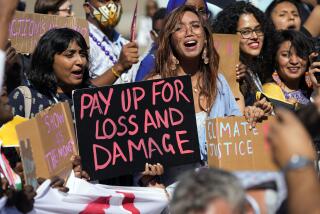Arabs, Israelis Plan Bank for Regional Development
- Share via
CASABLANCA, Morocco — Delegates to a Middle East economic conference agreed Monday to create a regionwide development bank that will include Israelis and Arabs on its board of directors and will concentrate on loans to job-creating private businesses, participants said.
The bank, to be created along with a regional tourist board and a chamber of commerce, will become the first official institution to bridge the Arab-Israeli conflict that has kept the region in turmoil for almost half a century.
U.S. Secretary of State Warren Christopher, who advocated a four-point program centered on the establishment of a regional bank in a speech to the opening session Sunday of the Middle East and North Africa Economic Summit, claimed victory in a Monday news conference.
“Every one of (the U.S. objectives) is being realized at this conference,” Christopher said.
“The Arab-Israeli conflict is coming to an end,” he continued. “This area, which has been poisoned for too long by this conflict, can look forward to better days.”
The purpose of the three-day conference, attended by government officials and more than 1,000 business people from over 60 nations, was to underwrite the Arab-Israeli peace process by producing tangible improvements in the region’s standard of living.
U.S. officials said a committee of experts will meet soon to work out details for the regional bank, a process they said will take about six months. Among the matters yet to be decided are the amount of initial capitalization needed and the shares that will be purchased by the West, by oil-rich countries of the Persian Gulf and by other members.
Although rumors of a $10-billion fund that circulated at the conference were said by officials close to the process to be far too high, European diplomats said the bank will be as well-financed as the one created to underwrite the transformation of the economies of the formerly Communist countries of Eastern Europe.
Christopher said the bank, unlike the World Bank and the International Monetary Fund, will emphasize loans to private businesses, rather than to governments, in an effort to generate jobs in both Israel and Arab countries.
In addition, Christopher said, the bank will finance “cross-border projects” such as roads, water development and other facilities that “knit the region together.”
As a result of the Arab-Israeli conflict, the region is very short on facilities that serve more than one or two countries, and most countries trade more with Europe, North America and even the Far East than with their immediate neighbors.
While Christopher emphasized economic development as an underpinning for the recent peace agreements signed by Israel with Jordan and the Palestine Liberation Organization, diplomats from the region noted the importance of Israelis and Arabs working together on development projects and in joint organizations such as the proposed chamber of commerce and tourist board.
Although 10 heads of state or government and 60 Cabinet ministers attended the sessions, the conference’s most significant work came in a series of seminars in which business leaders discussed regional development with government officials.
Saudi Arabia, the region’s economic heavyweight, shunned most high-profile events at the conference, but Saudi business leaders were active participants in meetings dealing with development of regional energy, transportation and water projects--which will require multimillion-dollar financing and offer work to their construction companies--and with the expansion of the regional banking system.
Christopher said high-level Israeli government officials met privately with groups of business leaders from Saudi Arabia and other conservative monarchies of the Persian Gulf.
The activities in Casablanca seemed to drive the final stake into the heart of the Arab economic boycott of Israel. Almost everything that happened at the conference was a technical violation of the boycott, but nobody seemed to care. In effect, the boycott is ended, although it remains on the books.
“The Arab boycott is a relic of the past,” Christopher said. He predicted that the Arab League will vote soon, possibly at a special meeting, to repeal the boycott officially.
However, the league moves only by unanimous approval, and it is possible that several countries excluded from the Casablanca meeting--such as Iraq, Libya and perhaps Syria--would veto formal repeal.
More to Read
Sign up for Essential California
The most important California stories and recommendations in your inbox every morning.
You may occasionally receive promotional content from the Los Angeles Times.












